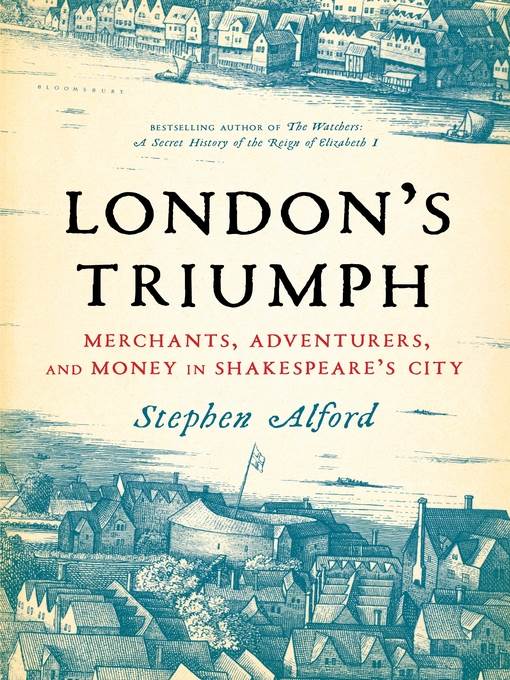
London's Triumph
Merchants, Adventurers, and Money in Shakespeare's City
کتاب های مرتبط
- اطلاعات
- نقد و بررسی
- دیدگاه کاربران
نقد و بررسی

October 9, 2017
Alford (The Watchers), a fellow of the Royal Historical Society, reveals how increased trading activity and bold speculation resulted in London’s significant economic and physical growth over the 16th century. Alford avoids delivering a dry financial account; instead, his swift chronology of fiscal maturation highlights the specific acts and lives of men such as Royal Exchange founder Thomas Gresham and the unfortunate Michael Lok, who financed Martin Frobisher’s failed search for Cathay. Daring merchants of varying economic means appear as worried yet energetic investors, moneylenders, and explorers. Their stories offer a glimpse into the merchant class as a whole, as Alford explores the specific homes and businesses of notable figures. Sources include family histories, official records, and a 15-page Flemish panoramic sketch. Tradecentric Antwerp and its ties to London receive the initial focus, contextualizing Londoners’ understanding of textiles and trade tactics. Alford then covers the fruitful forays of Englishmen Anthony Jenkinson to Russia and Richard Hakluyt to the New World. Fraught negotiations over Asian trade receive scant attention, with substantive trade gains getting more emphasis than unproductive diplomatic efforts. Alford eloquently shows how Renaissance merchants and global exploration allowed London to come of age, transforming from a city subordinate to other European hubs into an ambitious player with financial might. It’s a vibrant depiction of London’s rising merchant class during the Tudor era.

October 1, 2017
The transformation of the English capital from a provincial backwater to a cosmopolitan dynamo, courtesy of urban merchants who spearheaded global trade, exploration, and colonization.Alford (Early Modern British History/Univ. of Leeds; Edward VI: The Last Boy King, 2014, etc.) makes expert use of individual lives to bring London's various stages to life. Thomas Wyndout, who died in 1500, inhabited a stable, Catholic, late-medieval world of time-honored rituals and work lives ordered by the rules of trade guilds. Richard Gresham built his fortune through trade with Antwerp, the mercantile and financial center of Europe, then parlayed carefully cultivated connections with powerful royal officials to ascend to lord mayor of London in 1537. His son Thomas saw that London's merchants could expand English trade beyond Europe and rival Antwerp as lender to the crown. In 1553, explorers searching for Cathay wound up in Russia instead, and the resultant Muscovy Company, whose charter members worked hand in glove with the queen's government, made manifest "the interplay of money and political power" that shaped London's growth. Striving immigrants also played an instrumental role, as can be seen in the odysseys of Dutch expatriate Cornelis Spierincks, a Calvinist who, like many others on the continent, sought refuge from Catholic persecution in now-Protestant England, and his son, who moved out from an emigre community to become a true Londoner. These and many other stories bring the past to life in warmly human terms, as do Alford's evocative descriptions of the city's changing landscape and architecture. By 1600, when Richard Hakluyt's magisterial Principal navigations was completed, London's mercantile elite were confident and expansive enough to contemplate not just trading with the Americas, but colonizing them; the Virginia Company of London sent 295 settlers across the ocean in 1606. "The worlds that Londoners inhabited and imagined," writes the author, "were [now] simply far larger and more complex."Solid scholarly history written with an accessible verve that will appeal to general readers.
COPYRIGHT(2017) Kirkus Reviews, ALL RIGHTS RESERVED.

Starred review from October 15, 2017
Standing in the heart of early seventeenth-century London, John Earle surveys a heap of stones and men and hears a strange humming or buzz, mixed of walking, tongues, and feet. In this fascinating history of Tudor London, Alford helps readers to recognize the most significant of this burgeoning municipality's stones and men and to tease out the globe-shaping meaning of its dynamic buzz. Readers will relish what Alford tells them about the wrought stones of St. Paul's Cathedral, Drapers' Hall, the Royal Exchange, and other major London edifices. But far more fascinating are the men who move through these buildingsresourceful merchants such as John Isham, bold explorers such as Anthony Jenkinson, and shrewd financiers such as Thomas Gresham. And in the humming buzz such men collectively generate, readers will discern the sound of a metropolis awakening to its global destiny, challenging Antwerp, Madrid, Lisbon, and Augsburg in its international sweep. So widely does Tudor London pursue its interests that Alford's tale carries readers to China, Persia, Russia, and the Americas. Shakespeare counts as just one of the vibrant contemporary voicesdramatists, diarists, and preachersAlford quotes to convey the excitement and controversy in this remarkable city's ascent. Renaissance urban life unfolds as stirring drama.(Reprinted with permission of Booklist, copyright 2017, American Library Association.)

























دیدگاه کاربران